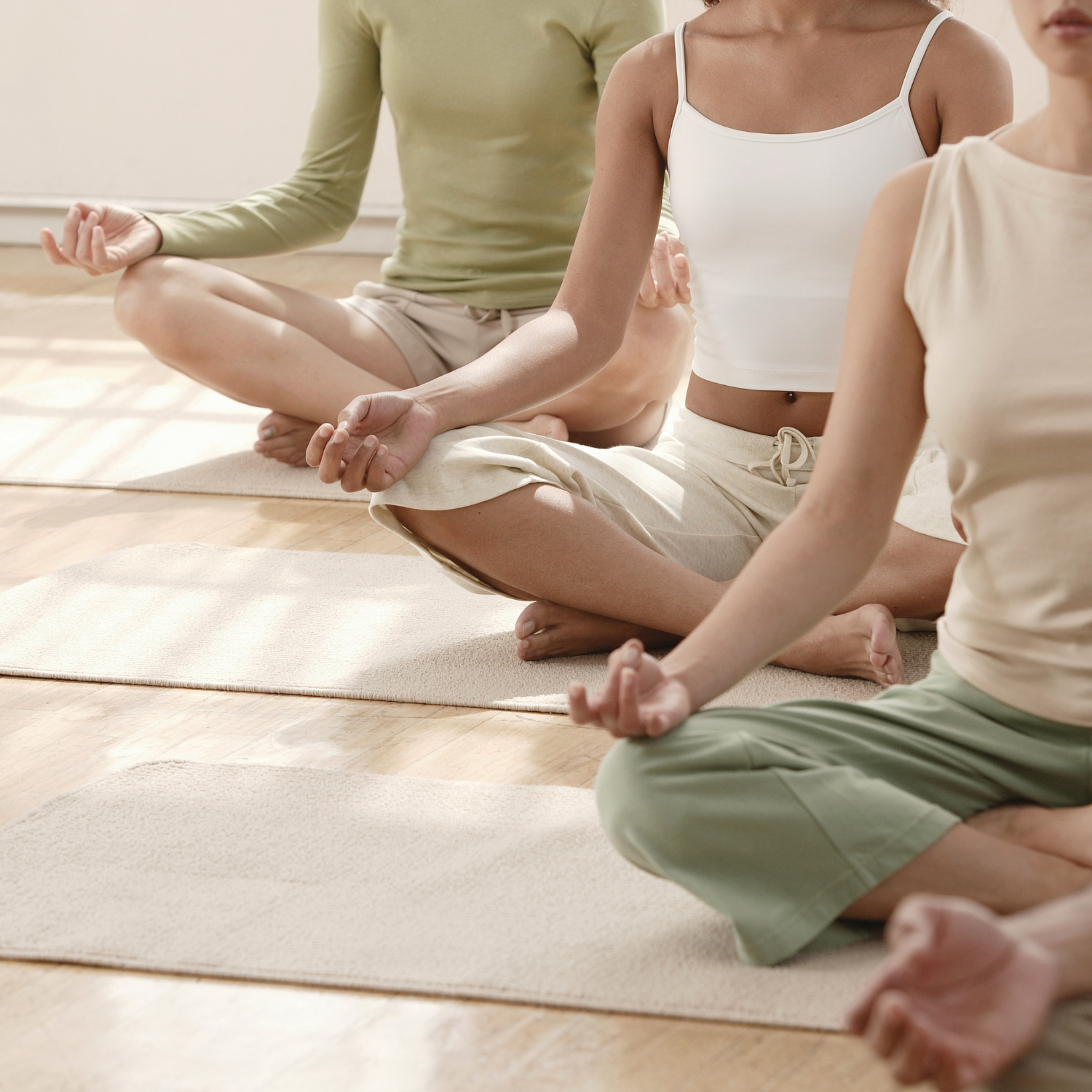Are you eating nutritionally and moving regularly but still not losing weight or struggling with brain fog and the afternoon slump? Have you mastered your sleep and your nutrition but still suffering from pain or anxiety? Despite your commitment to improving your health, it’s possible that you’re not nurturing all of the pillars of your health. In this 2-part series, I address five pillars of health to ensure holistic health. This post dives into two of the pillars – Connect and Sleep – and ways you can improve the pillar. The key is to create balance across all of the pillars and not about perfection in each one. So, get ready to assess if you need to improve in any of these pillars and learn about some ways to do that.
To read about Eat, Move and Relax pillars of health, check out my blog post Pillars of Health Part 1.
Connect Pillar of Health
The Connect pillar of health covers our relationships with ourselves, loved ones, our community, and beyond. It’s part of our nature to build relationships and we constantly seek companionship and support as we go through life. Because social connection is so hard-wired into human behavior, it makes sense that our relationships (or lack thereof) significantly influence our well-being. Building strong relationships with loved ones fosters a sense of belonging and support that is essential for overall health and happiness. However, loneliness and social isolation are widespread problems in the US. Surveys suggest that 1 in 3 US adults aged 45 and older feel lonely. Loneliness and social isolation can increase the risk of heart disease, depression, and cognitive decline. People with meaningful social connections have:
- Less stress and better sleep.
- Better overall health that can lead to a longer life.
- Healthier habits and behaviors.
- Better quality of life and a sense of belonging.

Five Ways to Connect With Others
“Connection is why we’re here; it is what gives purpose and meaning to our lives.” – Brené Brown.
So let’s explore five impactful way to strengthen your bonds with others and cultivate meaningful relationships. Whether you’re looking to deepen existing connections or forge new ones, these practical tips will empower you to navigate the intricacies of human connection with confidence and authenticity.
1. Schedule Regular Quality Time with Family and Friends
Prioritize quality time with loved ones including close friends. Gathering around the dinner table regularly without the distraction of devices is invaluable for families to connect on a deeper level. It fosters meaningful conversations, strengthens bonds, and creates cherished memories. Also, it can cultivate a sense of togetherness and enhance communication skills. Schedule regular date nights or outings with friends to strengthen these connections and create lasting memories.
2. Engage in Meaningful Conversations
Engaging in meaningful conversations is the cornerstone of building strong connections with others. Ask open-ended questions, actively listen, and share your thoughts and feelings openly. This allows us to truly understand one another and deepen our relationships. Through open and honest dialogue, we cultivate empathy, trust, and mutual respect, fostering a sense of intimacy and connection that transcends superficial interactions. These conversations provide a space for validation, support, and growth, strengthening bonds and nurturing a sense of belonging and understanding.

3. Volunteer for Community Service
Volunteering for community service not only serves as a vehicle for positive change but also strengthens the bonds within our communities. By coming together to support a shared cause, whether it’s organizing a local cleanup, participating in a food drive, or volunteering at a shelter, we forge connections based on compassion, empathy, and a shared commitment to making a difference. Volunteering provides opportunities to build relationships with fellow volunteers, neighbors, and those we serve, fostering a deeper sense of connection and mutual support within our communities.

4. Join Community Organizations or Clubs
Joining community organizations or clubs can nurture a sense of connection and belonging within our neighborhoods. By actively participating in groups aligned with our interests or causes, we engage with like-minded people who share our passions and values. Whether it’s a book club, environmental group, or sports team, these organizations provide a platform for meaningful interactions, collaboration, and collective action. Through shared experiences and common goals, we forge bonds with fellow members, contributing to a vibrant and supportive community fabric. This not only enriches our lives with new experiences and friendships but also empowers us to make a positive impact on our communities, reinforcing our sense of connection and purpose.
5. Perform Acts of Kindness
Some research suggests that practicing kindness may have more of an effect on health and happiness than diet and exercise. Acts of kindness send a signal to our brain that life is great and switches us out of “stress state” into “thrive state”. One study found that the more kind acts you do, the happier you become. It didn’t matter whether they were for loved ones or complete strangers. But perhaps the most powerful quality of kindness is that it ripples out into the world because the person you helped will likely be kind too.
One way to put this into practice is to intentionally perform one act of kindness every day for a week. After you’ve completed each act of kindness, check in with yourself and how it made you feel. To really maximize the benefit, start a journal and write down each act and how you felt afterward. How will you be kind today?
Sleep Pillar of Health
The Sleep pillar of health represents to the quality of our sleep. Quality sleep is not just the number of hours we spend in bed, it’s the depth and restfulness of those hours. We’re in the middle of a sleep deprivation epidemic partly due to endless distractions and a culture that reveres “getting by” with 6 hours’ sleep or less. But not getting enough sleep can have serious consequences on your health. In fact, an estimated 50-70 million Americans have some type of sleep disorder. There are different recommendations around the length of sleep. As a general rule, you should aim for 7 to 9 hours of sleep each night.
Some of the key benefits of quality sleep every night include:
- Restorative Benefits: During sleep, our bodies undergo essential processes of repair and rejuvenation. Adequate sleep supports immune function, enhances cognitive performance, and promotes emotional resilience.
- Hormonal Harmony: Hormonal fluctuations, particularly during perimenopause and menopause, can wreak havoc on sleep patterns. Prioritizing quality sleep becomes even more crucial during this phase of life. Adequate rest can help regulate hormones, alleviate symptoms such as hot flashes and night sweats, and contribute to a smoother transition through menopause.
- Mental Wellness: Quality sleep plays a pivotal role in maintaining our mental well-being. It allows us to manage stress more effectively, enhances mood regulation, and fosters a greater sense of emotional balance. By prioritizing sleep, we equip ourselves with the resilience needed to navigate the highs and lows of motherhood with equanimity.
Ultimately, sleep impacts the other 4 pillars of health. When you sleep well, it’s much easier to make better choices the following day. You crave less sugary food and feel more energetic and capable of being more physically active, engage in relaxation practices and connect with others. And, taking care of the other pillars means that you’ll sleep better.
To understand how quality sleep can affect your weight, take a look at my blog post How to Lose Weight and Keep it Off. Additionally, check out my blog post How to Have Energy All Day to understand the impact of sleep on your energy throughout the day.

Five Changes to Improve Your Sleep
There’s no reason to miss out on a great night’s sleep. The majority of sleep problems are related to lifestyle. Here are 5 lifestyle changes you can make to improve the quality of your sleep.
1. Embrace Morning Light
Exposure to natural light in the morning helps regulate our body’s internal clock, also known as the circadian rhythm, which governs our sleep-wake cycle. When you expose yourself to natural light in the morning, it signals to your body that it’s time to wake up and kick-starts important physiological processes. This helps synchronize your internal clock with the external environment, making it easier to fall asleep at night and wake up feeling refreshed in the morning. So, make it a habit to step outside or uncover your windows first thing in the morning to bask in natural light even on a cloudy or rainy day.

2. Enjoy Caffeine Before Noon
Caffeine is a big sleep disruptor and can prolong the time it takes to fall asleep, reduces sleep time and efficiency, and worsens perceived quality of sleep. The bottom line is, if you think your sleep could be better, you should try to avoid caffeine after noon. The reason for noon is based on caffeine’s half life which is about 6 hours. This varies from person to person depending on genetics and lifestyle. So, if you’re having caffeine in the middle of the afternoon, there’s a possibility that it’s still in your system when you’re trying to sleep.
3. Manage Your Stimulation Before Bedtime
For the 1 hour to 90 minutes before bedtime, it’s important to gradually reduce stimuli so that the body can naturally prepare for sleep. Melatonin, often referred to as the “sleep hormone,” plays a crucial role in regulating our sleep-wake cycle and promoting sound sleep. It’s produced in response to darkness and signals to our bodies that it’s time to wind down and prepare for sleep. This natural hormone helps reduce the time it takes to fall asleep, improves sleep quality, and enhances sleep duration. However, various factors such as age, stress, and exposure to artificial light disrupt melatonin production.
Below is a list of changes you can make to improve your sleep quality. This is not intended to be a “must do everything” list. It simply captures things that can interfere with your body’s readiness to sleep. You can decide what’s right for you depending on the quality of your sleep today:
- Be mindful of consuming stimulants such as caffeine and alcohol
- Limit screen time as the blue light emitted by electronic devices suppress the production of melatonin. If you need to use a device late in the evening, amber glasses help to filter blue light
- Engage in relaxing activities that promote sleepiness
- Stop eating or drinking sugary drinks at least 2 hours before your bedtime
- Exercise earlier in the day, at least 3 hours before bedtime
- Socialize earlier in the day
- Dim lighting progressively as it gets later
- Don’t watch the news, a thriller, or other stimulating show
- Don’t discuss stressful family matters before bed
- Don’t check work emails
- Set an alarm to tell you when you need to start getting ready for bed.

4. Create a Relaxing Bedtime Routine
A regular sleep schedule keeps the circadian sleep/wake cycle synchronized. People with the most regular sleep habits report the fewest problems with insomnia and the least depression. Experts advise getting up at about the same time every day, even after a late-night party or fitful sleep. In addition, establishing a bedtime routine for ourselves can signal to our bodies that it’s time to unwind and prepare for sleep. Incorporate calming activities to help transition into a state of relaxation such as:
- Reading
- Deep breathing
- Practicing gentle yoga, stretching or meditation
- Taking a warm bath
- Listening to soothing music or nature sounds
- Journaling
- Reflecting on the things you’re grateful for.
5. Create a Sleep-Friendly Environment
Make your bedroom a sanctuary for sleep by minimizing noise, light, and electronic distractions. Try to keep your bedroom completely dark and free of TVs or devices. Invest in a comfortable mattress and pillows, and ensure that your sleep environment is conducive to restful slumber. Consider opening a bedroom window. The best temperature for sleep is around 65°F (18°C). If you have ambient light even after closing your window covering, invest in a sleeping mask or blackout curtains.
Wrap-Up
So there you have it! A look at Connect and Sleep pillars of health and ways for you to strengthen them on your wellness journey. Remember that you can read about Eat, Move and Relax pillars of health in my blog post Pillars of Health Part 1. It’s important to give equal priority to every pillar and make changes at a pace that is comfortable for you. Achieving balance is what will lead to the biggest improvements and, most importantly, sustainable ones. Wondering how to start making changes? I’ve prepared a FREE tracker that you can download today. The Energize Your Day Tracker helps you make sustainable changes throughout the day across 4 of the pillars.
Have you already tried some changes but are still struggling in one or more of the Pillars of Health? Finding a balance across the 5 pillars can be challenging. I’m here to help! You can schedule a free coaching session tailored to your unique challenges and goals. Let’s work together to uncover personalized strategies for sustainable lifestyle changes.
YOU have the power to take the steps to mindfully transform your wellness on your personal journey.
The content provided in this post is for informational purposes only and is not intended to be a substitute for professional medical advice, diagnosis, or treatment. Always seek the advice of your physician or other qualified health provider with any questions you may have regarding a medical condition. Never disregard professional medical advice or delay in seeking it because of something you have read in this post.















+ Show / Hide Comments
Share to: